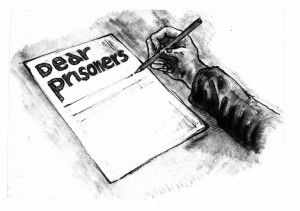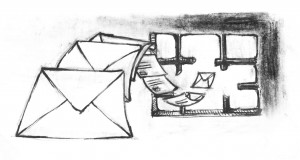Read this text in english
 Di fronte all’ampiezza del fenomeno repressivo che ha colpito così duramente la campagna SHAC, c’è un’arma che può aiutare a non far dimenticare un pezzo così importante per la storia della lotta contro la vivisezione, cioè la solidarietà.
Di fronte all’ampiezza del fenomeno repressivo che ha colpito così duramente la campagna SHAC, c’è un’arma che può aiutare a non far dimenticare un pezzo così importante per la storia della lotta contro la vivisezione, cioè la solidarietà.
Ci piacerebbe rompere quel muro di silenzio che si crea attorno al termine repressione, come se nominarla porti sfortuna o come se l’attitudine a non parlarne o non interessarsene faccia sì che questa non esista. Imparare invece a conoscere di cosa si tratta e prepararsi a questa eventualità, ci aiuta a renderla meno traumatica, scioccante e a farci meno paura.
Con questo capitolo vogliamo esprimere cosa intendiamo per solidarietà:
il concetto si basa sul riconoscimento di una complicità tra persone o gruppi che si sentono parte di uno stesso movimento; supportarsi a vicenda nel momento del bisogno; non permettere che le persone colpite rimangano isolate, sia nell’affrontare la reclusione, sia nella fase delle successive restrizioni. Di fronte all’efficacia delle nostre azioni, spesso seguirà l’inevitabile reazione dello Stato con procedimenti restrittivi di vario tipo. È dunque necessario che ci si faccia carico tutti/e delle possibili conseguenze della nostra lotta.
L’idea di finire in carcere o avere persone vicine in questa situazione non fa piacere a nessuno, anche solamente affrontare un processo o delle restrizioni può essere un evento stressante, che piomba sulla propria vita e, se non la distrugge, comunque la stravolge negativamente; le vicende repressive possono durare mesi, anni o purtroppo a volte tutta la vita.
In qualsiasi gruppo, collettivo, associazione, rete o anche tra individui che agiscono con determinazione è di vitale importanza discutere su come affrontare possibili conseguenze giudiziarie, piuttosto che come affrontare eventuali processi, denunce o arresti, quale atteggiamento tenere, come rispondere pubblicamente, ecc.. Nel momento in cui si decide di lottare per qualcosa bisogna essere consapevoli delle possibili conseguenze delle proprie scelte. Il modo in cui viene affrontata la repressione dimostra anche la maturità e la forza di un movimento.
A volte la repressione arriva dopo anni, in riferimento a campagne già concluse o azioni accadute molto tempo prima. Nel frattempo il movimento può aver cambiato priorità, scelto altri obiettivi e strategie, proprio come è il caso del movimento di liberazione animale rispetto ai primi anni di SHAC. Alcune strade si sono divise e si sono valutati gli errori del passato. Questo non toglie nulla al fatto che le persone colpite dalla repressione vadano supportate, al di là delle differenze, poichè l’idea di base che ci spinge a lottare rimane sempre la stessa, la liberazione animale. L’ampia diffusione di una campagna come SHAC in tanti paesi diversi allo stesso tempo è stato uno dei suoi punti di forza: ora non possiamo lasciare che siano pochi a pagare per l’efficacia che abbiamo ottenuto, facciamo sì che anche la solidarietà sia internazionale e il più estesa possibile al di là dei confini di Stato.
Uno dei modi migliori per esprimere la solidarietà è quello di portare avanti le battaglie o le campagne colpite dalla repressione. Certo, questo non è sempre possibile, a volte le forze sono limitate o le volontà non coincidono: ma spesso capita che le vicende repressive siano una spinta emotiva per liberazioni di animali o azioni dirette compiute proprio in nome della solidarietà con i/le prigionieri/e. Ci sono molti altri modi attraverso cui esprimere la solidarietà, come organizzare proteste, creare pagine web, intasare le linee telefoniche delle prigioni (sia per richieste specifiche, sia per disturbo). Fondamentale è anche spezzare l’isolamento di chi é dietro le sbarre inviando cartoline, telegrammi, lettere, libri, informazioni e aggiornamenti sulle lotte che continuano fuori e dentro il carcere. Sono cose così semplici e veloci che spesso ce ne scordiamo o non ci pensiamo del tutto.
È importante ricordarsi delle persone in carcere, o con restrizioni, nei discorsi durante le iniziative, nei volantini sui banchetti, sugli striscioni ai cortei, su riviste, siti web e in tutti i propri canali di informazione, dando aggiornamenti sulla loro situazione. Interessarsi alla loro situazione legale, capire se hanno bisogno di soldi o di un avvocato o, se già c’è, chi si occupa di questo e, se si hanno le possibilità, dividersi il lavoro. Pensare alla possibilità di organizzare un presidio di fronte al consolato o al tribunale per le giornate del processo: la presenza fuori dal tribunale crea particolare attenzione su cosa sta accadendo e conferisce una valenza politica alla propria causa.
Se possibile, andare a salutare i/le prigionieri/e durante le udienze è un’emozione fortissima che dà molta energia a chi sta rinchiuso/a e ribadisce ai giudici che le nostre idee attraversano le sbarre delle loro celle per continuare a motivare le attiviste e gli attivisti di tutto il mondo.
Molto altro si può fare per esprimere solidarietà, ma la base è riuscire a concepire il supporto ai/alle prigionieri/e come parte della stessa lotta che si sta portando avanti: sia essa contro la vivisezione, contro l’industria della pelliccia o della carne, ecc..
Anche solo un piccolo gesto tra tutti gli esempi detti sopra, può farci crescere, sia personalmente ma soprattutto come movimento per la liberazione animale.
*****
We would like to break that wall of silence that is created around the term repression. Sometimes it seems as if mentioning it might bring bad luck, as if the attitude of not speaking about it or not being interested in it makes it disappear. On the other hand, learning what it actually is and preparing oneself for this eventuality can help us to make it a less traumatic and shocking experience, and it will be less scary.
Sometimes it seems as if mentioning it might bring bad luck, as if the attitude of not speaking about it or not being interested in it makes it disappear. On the other hand, learning what it actually is and preparing oneself for this eventuality can help us to make it a less traumatic and shocking experience, and it will be less scary.
With this chapter we want to express what we mean by solidarity: the recognition of complicity between people or groups that feel part of the same movement. Solidarity means supporting each other reciprocally in times of need, not allowing the people hit by repression to be isolated during imprisonment and after release, when they have to suffer further restrictions.
If our actions are effective, there will be an unavoidable reaction from the state, with restrictive procedures of various kinds. It’s therefore essential that we all take on the possible consequences of our struggle.
The idea of ending up in prison or having people close to you in this situation is not pleasant for anyone. Facing a trial or having some restrictions can be a stressful event that falls on ones life and if it doesn’t destroy it, can anyway completely overturn it. The repressive events can last months, years and sometimes unfortunately even the whole life. In any group, collective, association, network or just individuals that act with determination it’s of vital importance to discuss how to face possible judiciary consequences, besides how to face possible trials, charges or arrests, how to behave, how to answer publicly, etc.
In the moment when you decide to fight for something you need to be aware of the possible consequences of your choices. The way you face repression shows also the maturity and the strength of a movement.
Sometimes repression comes many years later, referring to campaigns already closed or actions that took place long time before. Meanwhile the movement could have changed priorities, chosen new targets and new strategies. This is exactly the case with the animal liberation movement regarding the first years of SHAC. Some paths went apart and the mistakes from the past were evaluated. This doesn’t change the fact that people have been hit by repression need to be supported; it is important to overlook differences because the basic idea that pushes all of us to fight is always the same one, animal liberation.
The wide diffusion of a campaign like SHAC in so many different countries at the same time it’s been one of its strong points: now we must remember those who have to pay for the effectiveness that we all obtained, let’s make also the solidarity international and as widespread as possible, beyond State borders.
One of the best ways to express solidarity is the continuation of the battles and campaigns hit by repression; of course this is not always possible, sometimes the resources are limited or the will is not the same for everyone but it often happens that repression gives an emotional push to liberate animals or make direct actions in name of the solidarity with the prisoners.
There are many other ways to show solidarity: to organize demos, to create web pages, to block the telephone lines of the prisons (both with specific demands and for disturbing). In order to break the isolation of those behind bars it’s crucial to send postcards, letters, telegrams, books, news and updates on the struggles outside and inside prison. These are really simple and fast things to do, to make prisoners understand that we don’t forget them.
It’s important to remember people in jail or on licence during talks at some events, or with flyers on stalls , with banners during demos, in newsletters and magazines, on web pages and in general on all our information channels, giving updates about their situation.
It’s essential to be interested in their legal situation, to understand if they need money or a lawyer, or if there is already someone taking care of these things and if there is the possibility to share the work. To think about the possibility of organizing a demo in front of an embassy or at the court house during the trial: the presence outside a courthouse creates particular attention on what’s going on and gives a political value to the cause.
If possible, it’s good to go and greet prisoners during hearings. It’s a very emotional thing that gives a lot of energies to those who are imprisoned and reaffirms that our ideas go through the bars of their cells in order to keep on motivating activists worldwide.
Much more can be done to express solidarity, but the minimum we can do is to start to see prisoner support as part of the same struggle that is on the outside: be it against vivisection,against the fur or meat industries and so forth.
These are just a small selection of all the examples that can make us grow both personally, but most importantly, as a movement for animal liberation.
